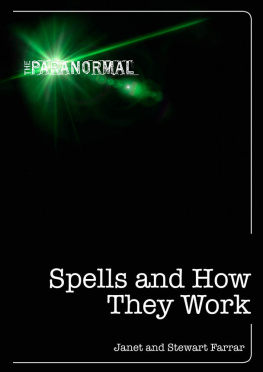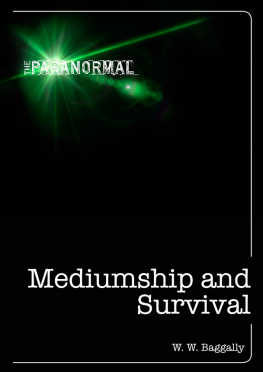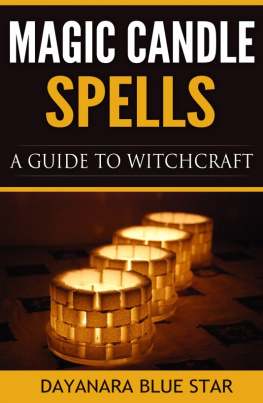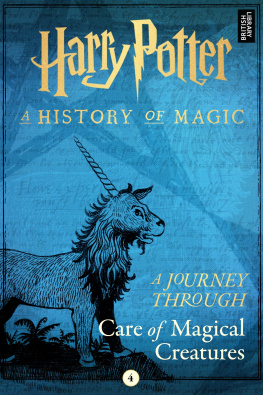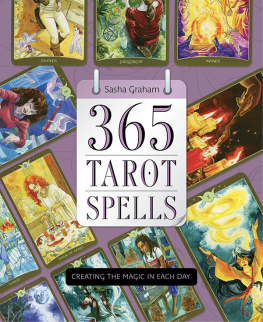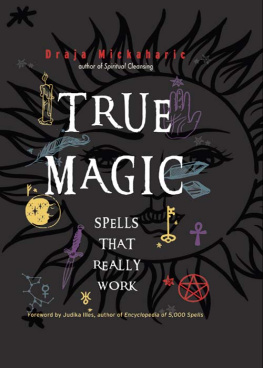It is our experience, as practising witches for twenty years, that provided they are properly performed, with an understanding of the principles involved yes, spells do work; if not always, then at least far more often than either coincidence or alternative explanations would allow.
Given this attitude, it is only sensible to ask oneself (1) why they work; (2) what are the operational principles used in making them work; (3) what code of ethics should one observe in deciding whether, and how, to perform a spell; and (4) what are the dangers involved.
In this book, we have tried to answer all these questions and a good many others. We have also given many examples of spells old and new.
But we would like to make one thing emphatically clear from the start. Observing the code of ethics (which we deal with in ) is not just a matter of being virtuous and able to live with your conscience. Unethical spell-working is not only harmful to the target. It is also extremely dangerous, and in the end self-destructive, to the person who works them. Not in any hypothetical Hell, but here and now.
To end with a personal plea. Our earlier books have provoked a steady flood of readers letters which still continues by almost every post; and we take this opportunity of apologizing to those readers to whom, through sheer pressure of work, we have replied inadequately or not at all. Many of them have asked us to work spells for them. Please do not ask it this time. Trying to solve the problems of dozens of strangers whom we have never met would drain us, or anyone else, in a week. It would also be irresponsible, because, however honest the writer tries to be, one cannot have the whole picture; after all, what doctor would diagnose and prescribe by post? And if you read this book carefully, we hope you will find we have pointed a way towards solving such problems for yourself.
I Do Spells Work?
The materialism of the Scientific and Industrial Revolutions of the past couple of centuries has dismissed as fantasy, or as purely psychological phenomena, all manifestations of psychic abilities and power; though, under it all, folklore and grass-roots instinct have known better. In recent years, the atmosphere has changed; serious scientists are investigating psychic phenomena on the assumption that there is something to investigate. And witches, and many others (including Christian faith-healers), are actively putting psychic powers to practical use. Much of this activity can be classified as spells, even though some of the activists would shun the word and there is overwhelming evidence that, properly done, spells do work.
The rationalism of recent centuries has achieved much. It has enabled us to master the physical level of reality to a degree undreamed-of before. It has made life (in some countries at least) healthier, longer, safer and better provided-for; anyone who thinks otherwise, and could time-travel back to slave-based Rome, or Inquisitorial Spain, or Victorian London or Dublin, within a week would rush back to our epoch as fast as he could press the button.
But the very enthusiasm and single-mindedness of that rationalism has thrown out some important babies with the bathwater. One of the most vital of these is the understanding that matter is not the only level of reality; that the other levels (which we shall examine in the ) are not mere superstition but active areas with laws of their own which can be understood with sufficient application.
The rationalist revolution has come full circle. It has brought us to frontiers within science itself at which the laws of mechanical materialism are no longer adequate; which is why the frontiersmen of that science are rethinking their vision of reality.
This book is about spells. Till recently, our rationalist culture lumped them with the other superstitions it believed it had outgrown. But a spell is merely a deliberate process for achieving a desired aim; what differentiates it from other such processes is that it uses levels and laws which mechanical materialism disowned. (It is interesting that the rationalist culture, with its gift for compartmentalization, has accepted prayer as at least respectable; yet what is prayer but a form of spell, an attempt to achieve what you want by putting yourself in tune with the non-material levels of reality?)
To work a spell, one must not dismiss rationality; one must use it as a tool, to understand the laws of the levels involved, to plan the operation in accordance with those laws, to analyse the results honestly and to learn from experience both the fruitful methods of working and the pitfalls one may encounter. And the paradox of this is that one must learn, rationally, when it is necessary to put rationality on one side and to work by intuition, emotion and all the faculties which rationality prefers to tame. And (again rationally) one must know the right moment to switch back.
Because in our experience, and countless other peoples, spells are not superstition. They are an effective method of achieving legitimate aims.
Let us look, then, at some of the laws and principles involved.
II Why and How
If effective spell-working depends on levels of reality and on understanding their laws and their interaction, what are those levels?
The names generally given to them in occult philosophy are the spiritual, mental, astral, etheric and physical levels some of them often subdivided. They are relevant, of course, both to the cosmos as a whole and to ourselves as human individuals. Since spell-working is an activity of human individuals, we will consider the levels particularly in that context.
U PPER S PIRITUAL This is the level of pure or abstract spirit, the inner divine spark of each of us. It draws its energy directly from the Great Unmanifest, the ultimate source of all things. Its astrological symbol is the Sun.
L OWER S PIRITUAL Sometimes known as concrete spirit. Occult theory holds that each of us is of the nature of one of the seven rays of the spectrum of existence, and that it is at the lower spiritual level that our particular ray sets the keynote of our individuality. Its astrological symbol is Jupiter.
U PPER M ENTAL Abstract mind, where the individual starts to form concepts under the influence of ones spiritual nature. Its astrological symbol is Mercury.
L OWER M ENTAL Concrete mind, defining, analysing and categorizing concepts and accumulating memory. Its astrological symbol is Saturn.
U PPER A STRAL Abstract emotions. Urge to relatedness. Images and thought-forms relevant to this. Its astrological symbol is Venus.
L OWER A STRAL Instincts and passions. Urge to attract or possess. Images and thought-forms relevant to this. Its astrological symbol is Mars.
E THERIC The tenuous energy-web of near-matter which links all the above levels with the physical, thus maintaining it in being. Its astrological symbol is the Moon.

